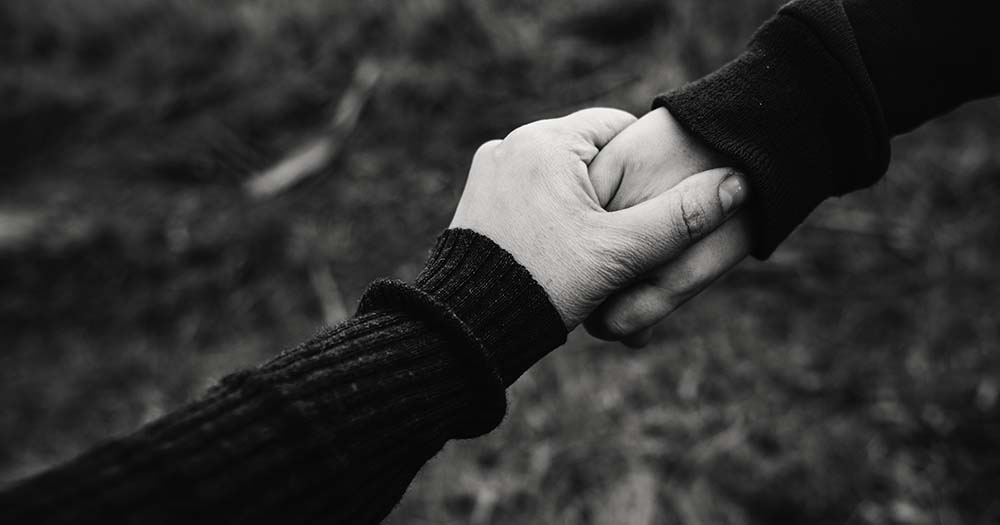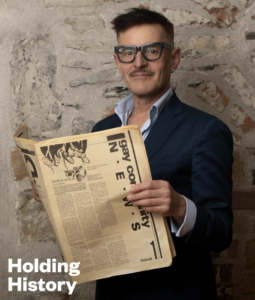It’s a chilly Friday morning and I’m walking to my local cafe before work with my platonic partner. The barista recognises us together in the queue and greets us with a friendly wave. She asks about our week, we chat about their playlist, and then she prepares our usual order: two oat milk cappuccinos.
She probably assumes we’re married, which is true. She also probably assumes we have a romantic or sexual relationship, which is false.
One of my favourite tenets of queer community is relationship anarchy. For me, that means disrupting the cultural norms presented by cisheternormativity and, instead, designing my family structure with care and intentionality from the ground up. The most important way I practice this is in my relationship with my platonic partner.
When I introduce someone to my platonic partner, they usually have questions about our relationship. The term is uncommon (although it is gaining recognition – #platoniclifepartner has 11 million views on TikTok!), but the concept isn’t new. In the 19th century, ‘Boston Marriages’ described long-term partnerships between cohabitating women. While I suspect that many of those partnerships were actually very gay, some were certainly platonic.
Some platonic partners are married to each other, others are not. Some pursue romantic and sexual relationships, while others are content without them. They usually cohabit, share living expenses, and navigate life together.
I’m attracted to the emotional safety, comfort, and stability that comes with a life-bond. There are biological and psychological reasons that we crave this – and the practical benefits of splitting a mortgage between multiple adults and sharing responsibilities is easier with a supportive partner – but for most of my life, I resisted the idea of marriage.
I heavily suppressed my sexuality when I was growing up. I idolised gay women, but I didn’t realise I was gay because only one type of relationship was available to me: heteronormative, monogamous marriage. I was taught that I’d build a relationship through a traditional relationship escalator (dating, cohabiting, marriage, children) and surrender my name and identity to that person.
None of that appealed to me. But a partnership where I’d consistently feel like the best version of myself? Living every day with my best friend? A future that feels stable and secure and hopeful? That’s what I wanted.
Professor Elizabeth Brake, a feminist philosopher, values platonic life partnerships because: “Not everyone thrives in sexual, romantic relationships. Some people are asexual or aromantic… some people are polyamorous… But being in a committed relationship… is good for our mental health.” I wish I had been asked to consider what values I’d look for in a platonic partner with the same enthusiasm that my aunt asked if I had a boyfriend. Instead, I married my best friend.
Partnering with him was an easy decision. We loved living together and cooking together and traveling together and working on projects together. Everyone expected us to get married, and we knew we wanted to continue to grow our lives together, so eventually, we made it legal.
At the time I identified as bisexual and aromantic, but most of my friends and family were straight, so I was rarely asked about labels or my sexuality outside of the bounds of, “Are you trying for a baby?!” to which I’d answer truthfully, “No”.
Planning our wedding wasn’t stressful. We knew we’d keep our own names. We wanted to be pronounced ‘partners in life’ instead of husband and wife. But mostly, we didn’t overthink it. When friends asked about colour palettes and dress styles, I shrugged. I love a good theme party, but when it came to the wedding, this stuff didn’t matter. As someone who identified as aromantic, the whole production felt performative and silly and unnecessary.
We talked about our “non-traditional marriage” although I struggled to explain those terms. We avoided traditional gender roles. We continued to prioritise our own hobbies and friendships outside of our partnership. We liked being partnered, and we’d figure out the rest.
Nearly ten years later, we are still figuring it out. I no longer identify as aromantic. It turns out, I’m a lesbian. Or I’m bisexual. I’m attracted to women and non-binary people so I’m still unsure about the label I most identify with, but I’m not attracted to cis men. My spouse is a cis man who is biromantic and asexual, so being platonically partnered feels like the obvious option for us.
Ideally, we would have been queer platonic partners from the beginning. Instead, we had to go through some incredibly confusing growing pains as we figured out these identities. It took a while for us to figure out the boundaries of our platonic partnership, but only because we had to unlearn ingrained habits. It was only confusing because we were deviating from the only option that had ever been presented to us.
Thankfully, for us, adjusting our relationship to reflect our sexualities was easy and natural. Now, our communication is better and our connection deeper. We’re not forcing ourselves into boxes that don’t make sense, we’re just living authentically as ourselves and choosing each other.
When I tell people about our dynamic, they tend to focus on what’s missing, but for me, a platonic relationship isn’t lesser. It’s better.
We’re both dating other people, and our partnership isn’t threatened by those relationships. Dating women is the most obvious and natural thing for me, but I didn’t know this until I first experienced a romantic connection in my 30’s. I didn’t endure my first heartbreak until the age of 34, and through all of it, my platonic partner was kind and present and supportive.
Admittedly, a lot of fears came up when he started dating women. I was happy for him, but I wondered if she would eventually want a normative relationship that didn’t include me, and how we would navigate that. When feelings of doubt or jealousy come up, we work through them. Like any relationship, this dynamic requires effort. The challenges we navigate are different from the ones my friends in monogamous, romantic marriages face, and we have to invent our own rules and boundaries.
For most of my straight friends and family members, the dynamic is difficult to understand because it deviates from the heteropatriarchal model they’ve idealised. I’ve had friends ask – candidly – if we’re delaying inevitable divorce, as if this grey area is gradual un-coupling. If we wanted to, we could get a divorce, but we don’t want to terminate our relationship.
We love each other. He’s my family and an extension of my queer community. There is no reason to extinguish our connection and the life we’ve built just because we aren’t romantically or sexually interested in each other.
Ultimately, figuring out that we’re not compatible romantically was a gift. We’re cohabiting, although we have our own bedrooms. We share financial responsibilities and care for our two cats. We’ve lived together and we’ve lived in different countries, but our connection has always been strong and grounding. We hug and share affection the same way best friends do, and it’s obvious that this is what our connection is meant to be. And in a fated, mystery-of-the-universe kind of way, that’s magical.
People love labels. Our marriage certificate solidifies our partnership and makes things like cohabitation and being emergency contacts make sense for other people, but it isn’t necessary. There’s a stigma for relationships that deviate from the norm, but this reimagined landscape is so much healthier and life-giving than what I imagined a traditional marriage to be.
My connection with my platonic partner feels like a superpower. It’s deeper than a friendship. He’s the common denominator that’s supported me through my most difficult moments, like grieving the unbelievably difficult unexpected loss of my dad. The mutual love and respect is life affirming and nurturing.
Monogamous romantic marriages can be so lovely, but they are not for everyone. For many of us, long-term friendships are often the most consistent and healthy relationships in our lives. I like platonic partnerships because they’re radical. They’re authentic. They’re chosen. They borrow from qualities of a close friendship, marriage, and polyamory, but somehow feel more secure than all of that.
I have so many married friends who have said their life would be better if they could live and co-parent with their best friends instead, and I want them to know that it’s a viable option.
I want everyone to feel able to break free of societal norms and pursue the life-long connections that feel most authentic and empowering.
This story originally appeared in GCN’s March 2023 issue 376. Read the full issue here.
© 2023 GCN (Gay Community News). All rights reserved.
This article was published in the print edition Issue No. 376 (March 1, 2023). Click here to read it now.
Support GCN
GCN is a free, vital resource for Ireland’s LGBTQ+ community since 1988.
GCN is a trading name of National LGBT Federation CLG, a registered charity - Charity Number: 20034580.
GCN relies on the generous support of the community and allies to sustain the crucial work that we do. Producing GCN is costly, and, in an industry which has been hugely impacted by rising costs, we need your support to help sustain and grow this vital resource.
Supporting GCN for as little as €1.99 per month will help us continue our work as Ireland’s free, independent LGBTQ+ media.

